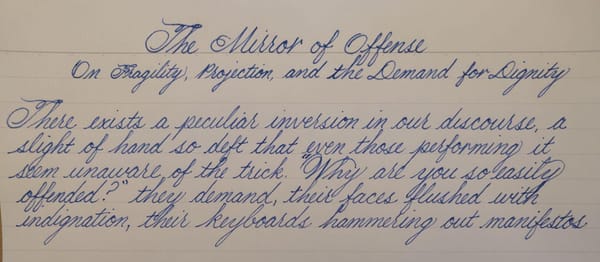What is Gender?
NB: Dear reader, this is the first attempt to create an article for this effort.
Your feedback is very much appreciated to help me see if I am hitting the mark or not based on the desired goal(s) to create informative, well-structured articles that (in no particular order):
- Clearly explains the TERF argument and its intended "gotcha"
- Demonstrate why the argument is fallacious or misguided
- Present relevant facts and context that undermine the argument
- Provide a compelling, evidence-based rebuttal
- Are organized for maximum clarity and impact
The articles should equip readers to understand the flaws in TERF rhetoric and counter those arguments effectively using factual information and sound reasoning. The structure should facilitate easy comprehension and retention of key points.
The argument and/or question
The TERF question, accusation, or claim is usually one of the following:
What is gender?
Define gender
…without using “identity”
…without using stereotypes
…without using roles
…in a non-circular fashion (self referential)
This is often an attempt to engage in a “gotcha” type argument. The rationale being something along the lines of:
Circular definition/logic
You can’t define something by using the word you are trying to define!
You can’t define a dog as a canine. It is self-referential! I win, lol!
Unable to properly define/cannot separate from gender identity, stereotypes, or roles. This means gender has no meaning!
I asked you to define ‘gender’ and you defined ‘gender identity’ or questioning why ‘gender identity’ was brought up.
You can’t separate the two, so you can’t even define gender! I win!
So gender is stereotypes? So it is a social construct, then why does it matter/how does gender identity become an innate trait if it is an identity based on a social construct? I win!
“roles” fall under a similar, if not the same argument/result
Gender is a linguistic term and has no meaning or purpose outside of linguistics.
often seen with “something something John Money” as an additional argument/point
So what is gender, or rather, how can we define gender in a non-circular way?
The Answer and/or Response
Gender is the psychological and social experience of one's sex characteristics and reproductive attributes. It is how an individual perceives, makes sense of, and interfaces with the amalgamation of sexually dimorphic attributes they possess (biopsychosocial). 12
Note what's missing from that definition - no mention of the word "gender" itself. No reference to stereotypes, presentation, or social roles. Just a straightforward description of gender as the experience of one's sexed and relevant reproductive traits.
This really shouldn't be that hard to grasp. We all have a body. That body has certain characteristics that relate to biological sex - genitals, chromosomes, hormones, etc. Gender is, in essence, the psychological and social reality we experience in relation to the physical markers of sex we possess. Gender does not equal genitals, nor does it equal “biological sex”3 ← whatever that means.
From this experience we have within ourselves, socially, and with our bodies, we can then derive the three underpinnings of gender as a complex interplay of social, psychological, and biological characteristics that make up one’s gender.
Thus we can state that gender encompasses our internal sense of being male, female, or another gender (gender identity), how we express that sense outwardly (gender expression), and how we are understood and treated by others based on our perceived gender (gender social position).
Gender is a fundamental part of one’s identity and an expression of human diversity that cannot be reduced to fixed categories. A part of that is how we psychologically relate to those physical characteristics. It's the internal sense of being male, female, or something else, based on how our brains interpret the sex-related attributes we have.
For most people, gender aligns with their physical sex traits and assigned sex. We call those people cisgender. But for a small percentage of the population, gender diverges from the sex they appeared to be at birth, causing gender dysphoria. Those people are transgender. It's not that complicated.
What's crucial to understand is that gender identity is not the same as gender roles or stereotypes.4 It's not about what toys you played with as a kid, what clothes you like to wear, or your personality traits. It's much more fundamental than that. A trans woman is a woman regardless of whether she conforms to stereotypical ideas of femininity. A trans man is a man even if he likes glitter and unicorns. Non-binary people are valid in their gender regardless of presentation. ‘Gender’ is just a word you’re using to describe your personality.
So there you have it - gender defined clearly and directly, without relying on the word itself or invoking sexist stereotypes. It's the internal, psychological experience of one's own sexual characteristics. Period.
The real question is, why are anti-trans activists so obsessed with demanding we define gender to their arbitrary specifications? The answer is simple - it's a distraction tactic.5 By setting up impossible hoops for trans people to jump through, they can pretend our failure to meet their absurd criteria somehow invalidates our identities. It opens the door for linguistic hair splitting as a basis to undermine the validity or utility of the word and the related concepts. It is an attempt to recenter the conversation away from the lived experiences of actual people, of the science and data that validates those experiences, and to invalidate the core concepts and dehumanize those who fall outside the ideology of the “gender critical” anti-trans/transmisic TERFs. 6
But here's the inconvenient truth: we don't need the approval of TERFs, “gender critical” anti-trans ideologues, and transmisic people to know ourselves. Trans people understand gender on a deep, visceral level through our own lived experiences. We define gender every day through our courageous choice to live authentically. Trans people are painfully aware of their gender and their sex - there is no denial involved; in fact, it is that very acceptance of both those facts is what brings trans people out and seeking the help, support, and care they need to thrive! No amount of semantic games from TERF keyboard warriors can take that away from us.
Now to deconstruct some fallacies of TERFs who try to use these arguments, such as:
- False dilemma/bifurcation fallacy: Presenting gender as either identical to biological sex or a meaningless social construct, ignoring the complex biopsychosocial reality.
- Moving the goalposts: Demanding that gender be defined without reference to related concepts like identity, roles, etc. and then claiming victory when those arbitrary criteria aren't met.
- Equivocation: Exploiting the ambiguity of terms like "gender" and "sex" to make specious arguments, e.g. conflating gender roles with gender identity.
- Appeal to definition: Insisting that dictionary definitions trump the lived experiences and self-understanding of trans people.
- Strawman: Misrepresenting the trans position as a denial of biological sex rather than an affirmation of gender diversity.
So watch out for these in the first ask of “what is gender” or in their follow up points. Often if just means moving the goalposts. Typically it is expected to be a “gotcha” of some sort, so when you come with a well reasoned and concise definition, they will either move the goal posts, ignore it to some entirely different point, or attempt to pick it apart. Call them out on the first directly, address the new point only after you point out “well, since we have a definition that is acceptable…” to point out they concede their arguments re: gender, and for the last one, it almost always includes a need to split hairs, ask questions that provide false dilemmas, or are constructed in a way that presents a comparison that is not valid, such as “biological sex” vs “gender”. A common rebuttal is “this doesn’t make sense at all, because gender is based on your sex, not anything else” which is an example of a false equivocation, and is not longer about gender as a conceptual whole, but about gender identity.
NB: In case you cannot access a specific article mentioned here let me know. Chances are I have a PDF I can email you. For books, please support the author(s).
Sevelius, J. M. (2013). Gender affirmation: A framework for conceptualizing risk behavior among transgender women of color. Sex roles, 68(11), 675-689. ↩
Westbrook, L., & Schilt, K. (2014). Doing gender, determining gender: Transgender people, gender panics, and the maintenance of the sex/gender/sexuality system. Gender & Society, 28(1), 32-57. ↩
Fausto-Sterling, A. (2000). Sexing the body: Gender politics and the construction of sexuality. Basic Books. ↩
Olson, K. R., Durwood, L., DeMeules, M., & McLaughlin, K. A. (2016). Mental health of transgender children who are supported in their identities. Pediatrics, 137(3). ↩
Serano, J. (2016). Whipping girl: A transsexual woman on sexism and the scapegoating of femininity. Seal Press. ↩
Bettcher, T. M. (2007). Evil deceivers and make‐believers: On transphobic violence and the politics of illusion. Hypatia, 22(3), 43-65. ↩


